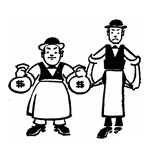
The Undeserving Poor
ON IRRATIONAL GIVING
One of the most memorable scenes in George Bernard Shaw’s 1913 play Pygmalion is the encounter between Professor Higgins and a conniving dustman named Alfred Doolittle. “I’m one of the undeserving poor: That’s what I am,” intones Doolittle. “Think of what that means to a man. It means that he’s up against middle-class morality all the time. If there’s anything going, and I put in for a bit of it, it’s always the same story: ‘You’re undeserving; so you can’t have it.'”
Doolittle expands on this theme, emphasizing that his needs as a member of the undeserving poor are not less than those of his more deserving counterparts. “I need more,” he claims. “I don’t eat less hearty than him; and I drink a lot more.” Shaw inserted this bit as comic relief — a disreputable scrounger advancing the cause of the undeserving poor. Audiences saw the apparent irony of it, and they chuckled. In fact, the scene was included, with little alteration, in the musical version of Pygmalion, the popular Broadway hit My Fair Lady.
It can be hazardous to take a serious look at something intended as a piece of comedy, but it just might be that Doolittle’s bold defense of the undeserving poor is worthy of a bit of reflection. It is unlikely that Shaw, a committed utilitarian atheist, was consciously setting forth a principle of Christian charity. From his point of view, the idea that the undeserving poor should be treated on par with their more worthy counterparts is laughable — and contributes to the comedic impact of the scene. But perhaps his shabby and devious character Doolittle really did hit on an important Christian principle, albeit in a wildly twisted and self-serving way.
Who are the undeserving poor? The first requirement for membership in this group, obviously, is that one be poor, in the material sense. Second, one must be undeserving — undeserving of our alms, our support, our charity: The fundamental mark of the undeserving poor is a habitual failure to practice the virtues, especially the virtues of diligence and gratitude. The undeserving have a history of making bad choices, often motivated by hedonistic wants.
So we find it amusing when Doolittle insists that generous people should not discriminate against his kind. But perhaps we ought to ask whether Doolittle might be correct. Practical men might offer a quick answer: “No. Doolittle is incorrect. Resources are finite. If we help the undeserving, then it means less for the deserving, and that would be a violation of justice.” That certainly sounds right. Ten thousand practical reasons could be given for concentrating our efforts to assist the deserving poor. As for the undeserving poor, well, they don’t deserve anything — by definition.
You May Also Enjoy
The “crisis of modernity” remains unresolved by a “sham conservatism” that merely sanctions the unbridled pursuit of worldly success.
Sr. Elizabeth Johnson warns that if we take literally the "naming" of God in the "image of powerful men," we turn God into an "idol."
The earnest Christian acts from the noblest motives and with the purest intentions, never trying to live the double life of serving both God and mammon.

